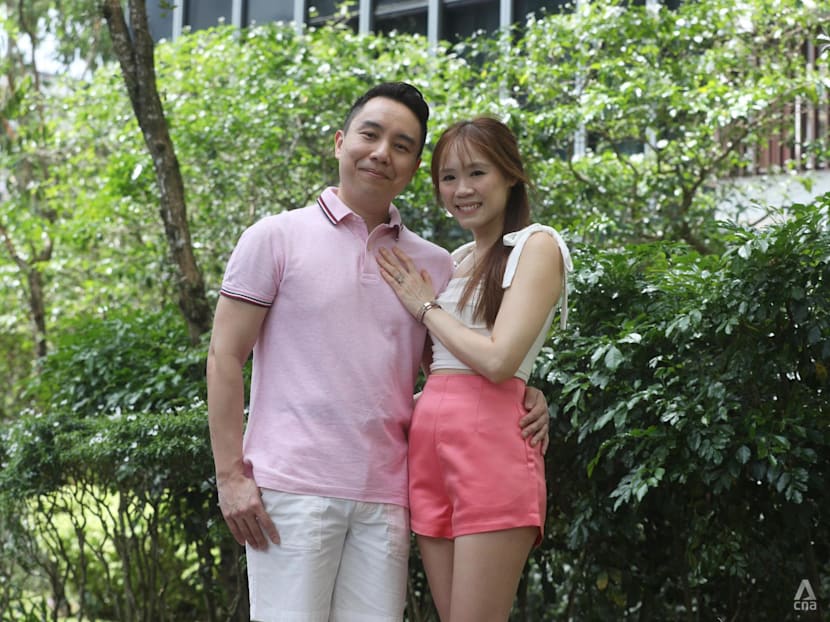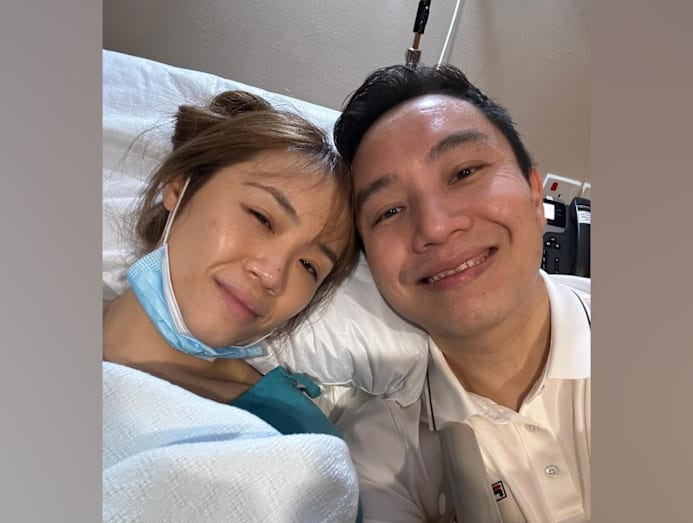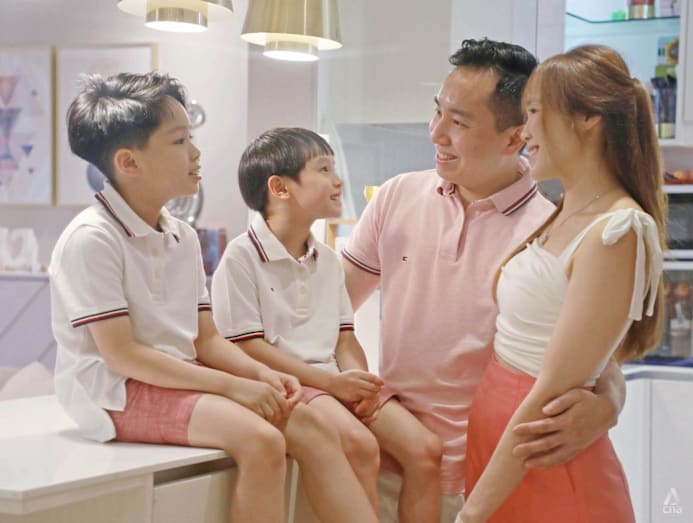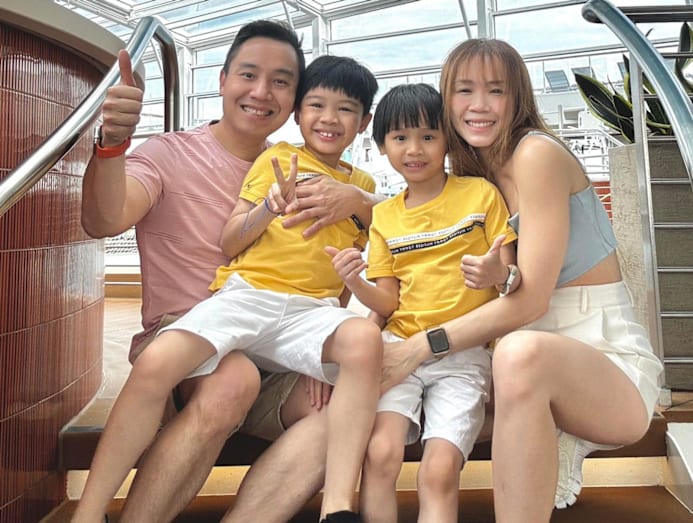Last year, my wife was diagnosed with cancer. This is how our family pulled through
Mr Eddie Yew has spent his entire career advising clients on how to prepare for life's uncertainties, but was caught off-guard when his wife received a life-changing diagnosis in 2024.

Mr Eddie Yew pictured with his wife Stephanie, who was diagnosed with cancer in early 2024. (Photo: CNA/Alyssa Tan)

This audio is generated by an AI tool.
For nearly two decades, I've advised clients on how to prepare for life's uncertainties. I believed I had done the same for my own family.
Like with my clients, I reviewed our situation carefully – our income, medical history, and the level of protection required to maintain our lifestyle if something unexpected happened. With that in mind, I secured what I believed was sufficient coverage for both my wife and myself.
Then everything changed.
In 2024, after a routine health screening for bacterial infection, my wife Stephanie was diagnosed with early-stage cancer. She was only 35.
There were no warning signs, no family history to preempt this. Just some lingering stomach discomfort after a family trip to Osaka in December 2023, and suddenly, our lives were turned upside down.
Weeks of tests and referrals followed, and before we knew it, she was in surgery in February 2024. Her recovery took two months. Everything happened so quickly that it was hard to process.
We were fortunate in many ways. Early detection gave us options, and the insurance protection we had in place helped us cope.
But it was during this time that I came face to face with a gap in early critical illness coverage – something I had explained to clients many times, yet never truly felt until it became my own reality.
WHEN LIFE STOPS WITHOUT WARNING
"Wife" seems too simple a word to describe how important Stephanie is.
She's not just my spouse and partner. She's the mother of our two boys – now aged nine and eight – the backbone of our household, as well as my personal assistant at work. She coordinated my meetings, managed our sons' school schedules and planned our meals.
She kept our lives running.
When she had to step away to recover, I had to take over.
Very quickly, I developed a brand new appreciation for Stephanie. Juggling her many roles was much tougher than I had known or expected, even after several years of marriage and co-parenting.
From school runs to handling last-minute client requests, every day felt like a race. I often stayed up late until 1am replying to emails, then woke up early at 6.30am to get the boys ready for school.
After just a few months of taking over her day-to-day responsibilities, I felt very overwhelmed with both work and the kids.

Other complications quickly arose.
For instance, I needed to focus on caring for Stephanie and the children, so I cut back on work. Some clients understood and agreed to make certain concessions, such as moving to virtual meetings. Others chose to wait, which meant a drop in income.
Even when I was with clients, my mind constantly drifted home.
"Is Stephanie okay?" "Did the boys finish their homework?" My brain was buzzing with such thoughts all the time, and it was hard to be fully present with work.
We decided not to tell our sons much at first, since they were still so young. But when Stephanie came home from the hospital and spent days resting in bed, they began to notice.
Our youngest asked: "Is Mummy just sleepy?" It was a simple question, but it broke my heart.
Eventually, we told our boys that Stephanie had a "bad illness" that would need months to recover from. Thankfully, they understood us when we said not to disturb Mummy during her rest time.
Through it all, Stephanie and I grew even closer. We had always supported each other, but now we understood how much we each carried for our family.
SAVED BY FORESIGHT
When the hospital bills arrived, to our great relief, our out-of-pocket expenses were minimal because of the critical illness coverage we already had in place.
It meant we could focus on her recovery and keep life steady for the boys. That stability was the real value of our planning; it enabled us to not only settle bills, but also manage the situation without added financial stress.
The S$300,000 in claims gave us breathing room – it helped cover our income loss and the boys' supplementary classes. We've also invested the remaining sum into dividend-paying funds as part of planning for future expenses.
A few weeks into her recovery, Stephanie asked if we should apply for more critical illness coverage since she was no longer covered for early critical illness.
We tried, but the answer came back quickly: declined. Her recent diagnosis meant her health profile had changed, and she no longer qualified for additional critical illness coverage.
I knew this would be the result before we even applied. I've explained this to clients countless times before: Once a condition appears, certain options may no longer be available.
But living it was different. It hit me that this was the "protection gap" so many people only discover when it is too late to act.
Our earlier decisions now mattered more than ever. The critical illness coverage we had taken up in 2015 and 2020 could not be added to, but it was there when we needed it. Without it, the financial strain would have been far greater.

WHATEVER IT TAKES
Going through this has reshaped the way I think about planning – not just as a financial adviser, but as a husband and father.
Protection is not about predicting every challenge. It is about acting while you still have the choice, so your family can keep moving forward even when life takes an unexpected turn.
For us, that meant the boys could continue with their routines, Stephanie could focus fully on her recovery, and we could make decisions from a place of calm rather than urgency.
Today, Stephanie is doing better. She's not in remission, and her condition isn't yet fully stabilised as some abnormal cells are still present.
She's on a schedule of supplements and regular check-ups – but even though life is different now, we've found some much-needed stability.
Since this ordeal began, we've also focused more on spending time with each other and appreciating each other's presence. We exercise together, eat healthier meals, and have become more intentional about putting our family first.
We're growing stronger and healthier together, and so are our bonds with each other and the boys.
Our love didn't just survive this setback – it blossomed and grew even stronger.

One of Stephanie's greatest joys in recovery has been travelling together. We've since taken short trips to places such as Hong Kong, Penang and Chengdu.
This isn't about ticking off as many destinations on a list as we can. These trips have become a way for us to create memories, stay close and celebrate the moments we once took for granted.
Stephanie's journey with cancer has reinforced something I will carry with me always: The right protection is not just about the right policies and coverage plans.
Ultimately, it is about doing whatever it takes to put your family first, so that your loved ones can face whatever comes with strength and security.
Eddie Yew is the senior vice-president of financial services at Manulife Advisory Group. He is also a husband and father of two.
If you have an experience to share or know someone who wishes to contribute to this series, write to voices [at] mediacorp.com.sg (voices[at]mediacorp[dot]com[dot]sg) with your full name, address and phone number.












